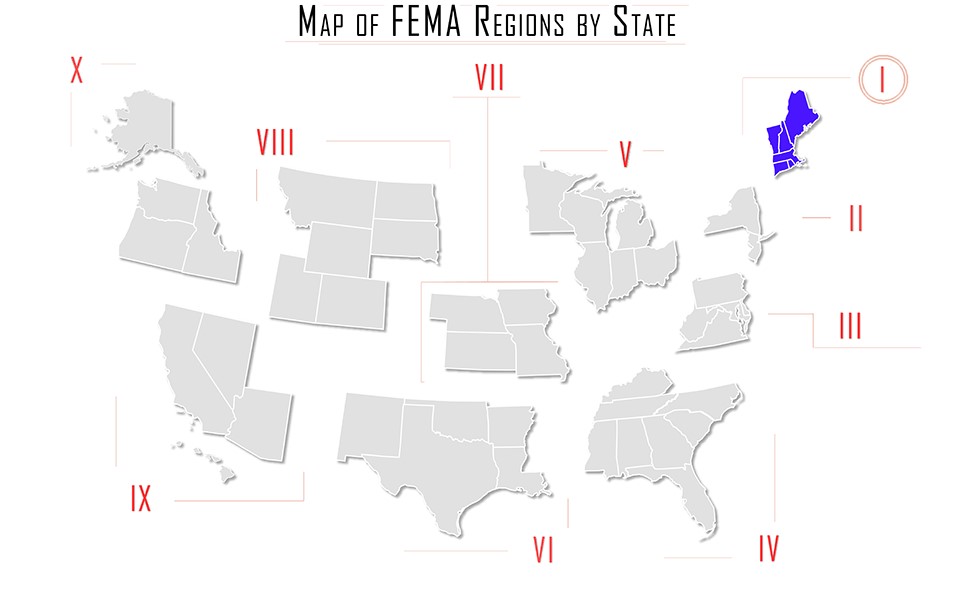.png)
At the Region is an ongoing feature that discusses the state-by-state training, certification and employment requirements of first responder departments across the nation by FEMA region. In this article, At the Region looks at law enforcement requirements in Region I, Connecticut, Massachusetts, Maine, New Hampshire, Rhode Island, and Vermont.

Law enforcement includes an extremely diverse range of agencies dedicated to promoting safety and public order through the application of national and regional laws and regulations. The variation of laws and penalties nationally and internationally necessitates region-specific training and specialization, while at the same time, officers must be familiar with overarching legislation and judicial decisions governing procedure and jurisdictional reach. This applies to agencies at the federal, state, county, and municipal levels, all of whom serve and protect their constituency in a dangerous field that exists within a complex and challenging framework.

Connecticut
The Connecticut Police Officer Standards and Training Council is empowered to certify, decertify and regulate the training of police officers pursuant to Chapter 104, Part 1, Section 7-294a-e of the Connecticut General Statutes. “Admission to the Connecticut Police Academy is restricted to either gainfully employed police officers or "probationary candidates" in the position of police officer, who have already been hired, and are insured by their employing agency while in attendance.”
Minimum Requirements:
• 21 years of age
• Citizen of the U.S.
• Have a valid driver’s license
• High school diploma or GED
• Pass a background check
• Pass a written entry exam
• Pass a physical fitness test
• Pass a medical and psychological exam
• Pass a polygraph test and oral interview
• Initial certification must be obtained within one calendar year of the person’s date of hire as a "probationary candidate."
• Initial certification is granted for three years; police officers are required to obtain the needed number of review training credits during each period of certification to allow the Council to renew the certification for a subsequent three-year period.
Visit the Connecticut POST FAQ for more information.
Reciprocity
The Police Officer Standards and Training Council will evaluate, in comparison to current requirements, where the officer seeking Connecticut certification:
• Has at least two years of full time employment with a law enforcement unit
• Has not had more than three years separation from a law enforcement unit.
• Has previous basic training and certification as a police officer;
• Formal, professional and in-service training and education in law enforcement or criminal justice, and
• Length of service and field experience as a police officer.
Beginning in 2015, the Connecticut POST considers Military Police Training as substitute for POST basic recruit training, based on experience.

Massachusetts
The Massachusetts Municipal Police Training Committee is responsible for the development, delivery, and enforcement of training standards of municipal, University of Massachusetts, and Environmental police officers of the Commonwealth. Massachusetts offers both a full-time and part-time course of study at the training academy.
Candidates accepted into the full-time police academy must be:
• a minimum of 21 years old and;
• employed or sponsored by a municipal, environmental, or University of Massachusetts police department or, if authorized by the Committee, some other law enforcement department
• Pass the Massachusetts Human Resource Division's Physical Ability Test (PAT) and pass a medical examination within six months of the academy start date
Candidates accepted into a reserve/ intermittent training program must be • a minimum of 18 years old and;
• employed or sponsored by a municipal, environmental, or University of Massachusetts police department or, if authorized by the Committee, some other law enforcement department.”
All recruits must have health insurance, a police car for driving instruction, and sign a liability waiver before beginning the academy training.
Reciprocity
Out of state candidates can work with their hiring agencies to request an execmption from the academy. MTPC may award Exemptions for full-time officers only. If seeking an exemption:
• The appointing authority must request the exemption and supply appropriate documentation.
• Per 550 CMR 3.03, to qualify for an exemption, the appointed officer must have attended a recruit academy “substantially equivalent to or greater than that of a Massachusetts police officer at a comparable level of experience…” and must have “obtained a minimum of two years of full-time law enforcement experience since completion of the entry-level police academy.”
• The officer cannot have a break in service exceeding five years.
• If the exemption is granted, the officer then has 90 days to complete the Orientation Training Program.

Maine
Maine Police Officer Recruitment and Training is accomplished in three phases. Candidates must complete a 40-hour online Law Enforcement Pre-Service Program and the 80 hour Phase II program prior to being employed by an agency. Recruits must also complete the 18 week Criminal Justice Academy program and minimum mandatory hours of supervision before certification. In order to be admitted into the Law Enforcement Pre-Service Program (Phase I) a candidate:
• Must be least 21 years of age with a high school diploma or GED, or 20 years old with an associates degree or 60 credit hours of post-secondary education, 19 years old with has completed 40 credit hours and is currently enrolled in post-secondary education.
• Pass a medical exam and submit a medical certificate provided by the Academy,
• Pass the physical fitness standards
• Pass a background check, including a state and federal criminal records check through the submission of fingerprints to the State Bureau of Identification and the Federal Bureau of Investigation;
• Be of good moral character, as determined by a thorough background investigation by the hiring or sponsoring agency;
• Pass a psychological exam
• Pass an oral interview
• Did not falsify or misrepresent any information during the application process, background investigation, or polygraph examination.
• Hold a valid motor vehicle operator's license. If such license is not a Maine license at the time of admission to the Academy, the applicant shall obtain a State of Maine license within the time limits prescribed by Maine law; and
• Pass a writing and reading exam
Students must complete the MCJA application for the MCJA LEPS Phase I and submit with a $250 fee, cash or check made payable to Treasurer, State of Maine to:
Maine Criminal Justice Academy
15 Oak Grove Road
Vassalboro, Maine 04989.
Phase II: Students must complete the 80-Hour Interactive, Scenario Based Classroom Program. Prior to the start of Phase II, students must complete the MCJA application for the MCJA LEPS Phase II. All students must meet the prerequisites listed below and send to the Academy all the required paperwork described below.
Phase III: After being hired by a Law Enforcement Agency as a Law Enforcement Officer, a provisional certificate will be issued upon receipt of a MCJA Notice of Employment and a MCJA Firearms Proficiency Form signed by a Certified MCJA Firearms Instructor. The employing agency must provide 80-hours of documented supervision before certification as a Law Enforcement Officer is granted by the Criminal Justice Academy. The Chief Law Enforcement Officer will have to sign a notarized MCJA Form stating the officer has completed the 80 hours of supervision to his or her satisfaction.
Reciprocity
Maine has a Basic Law Enforcement Training Program (BLETP)waiver process to evaluate candidates who hold certification from another state or military police training. Candidates must meet the Phase I entrance criteria and the hiring agency must submit the request for waiver evaluation.

New Hampshire
The New Hampshire Police Standards and Training Council governs all training for law enforcement in the state. To attend the police academy, a candidate must be hired by a state, local or county law enforcement agency in New Hampshire. PTSC offers both full-time and part-time academy training.
Minimum Academy Requirements include:
• No serious criminal or motor vehicle record,
• good credit history,
• pass a background investigation and fingerprint check,
• pass a psychological evaluation,
• pass a medical exam by a licensed health professional,
• meet the visual acuity and hearing standards
• pass a physical fitness test (Cooper)
Each hiring agency sets its own minimum standards for police officers, which may also include age and education requirements, written and polygraph exams, and an oral interview.
Reciprocity
The New Hampshire police academy is reciprocal with all other states, the Corrections Officer Academy is not. Currently serving and certified, academy-trained, full-time police officers in another state, may be eligible to have some Academy subjects waived. New Police Officers still attend the “New Hampshire Law Package” training, and must pass tests on these modules. All out of state certified and military police officers must still meet all the pre-hiring and background investigation requirements, pass the medical and psychological exams and the physical fitness test.

Rhode Island
The Rhode Island Police Officers Commission on Standards and Training (POST), with the approval of the Commissioner of Public Safety, establishes the courses of training and sets rules and regulations relative to the education, physical standards, and personal character of candidates and trainees. Local police department and agencies recruit and hire candidates before they can attend the Municipal Police Academy in Rhode Island. The department must submit an application packet to RIMPA for a recruit to receive a class seat.
General requirements from the packet include:
• pass a background and fingerprint check
• Pass a medical exam
• Pass a psychological exam
• Pass a physical fitness exam
• Have a letter of conditional employment from the sponsoring agency
Reciprocity
Rhode Island requires full POST certification for officers. There is a “case by case” waiver available, however, recruits must typically complete 200-300 hours at the Rhode Island Municipal Police Academy.

Vermont
The Vermont Criminal Justice Training Council (VCJTC) trains and certifies law enforcement officers in the state. To become certified, recruits must pass all entrance qualifications and attend either the Level III (full-time) Basic Training Academy Program or the Level I & II (part-time) Academy Program. Each department hires its own officers, and entrance requirements will be based on the department. However, the VCJTC has the following requirements for all recruits:
• Pass a Written Entrance Exam,
• Pass the MMPI (psychological inventory), and
• Pass a PT or Physical Testing exam
Reciprocity
Vermont has a training waiver process for out of state Police Officers. All officers seeking a waiver must complete the Waiver Certification course. Completed waiver request packets are submitted to:
Director Drew Bloom
Vermont Police Academy
317 Academy Road
Pittsford, VT 05763
802.483.2738








